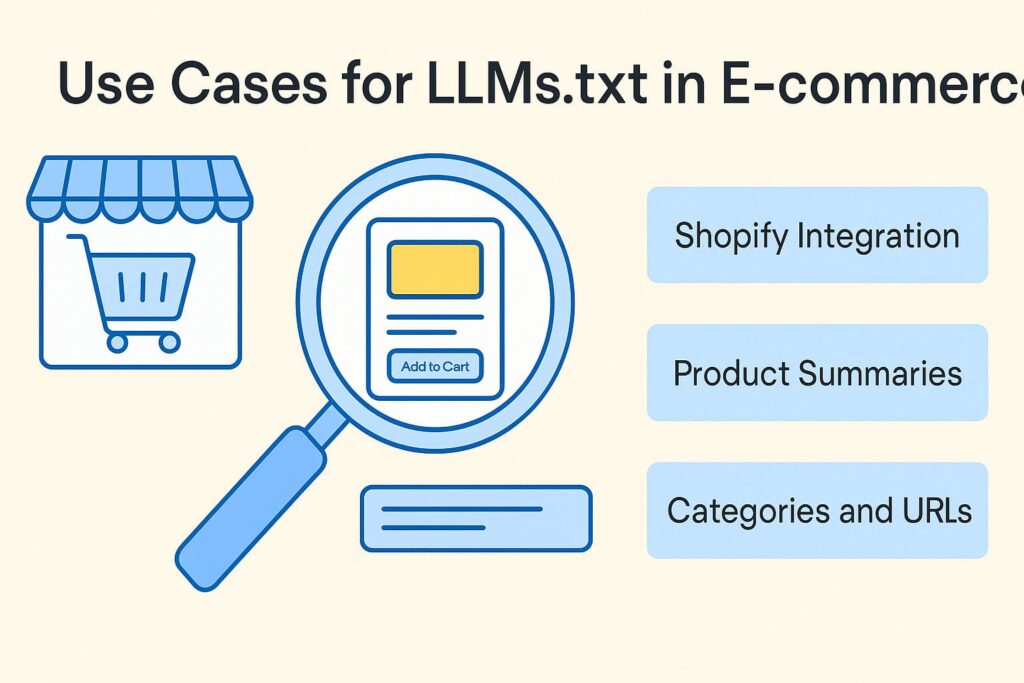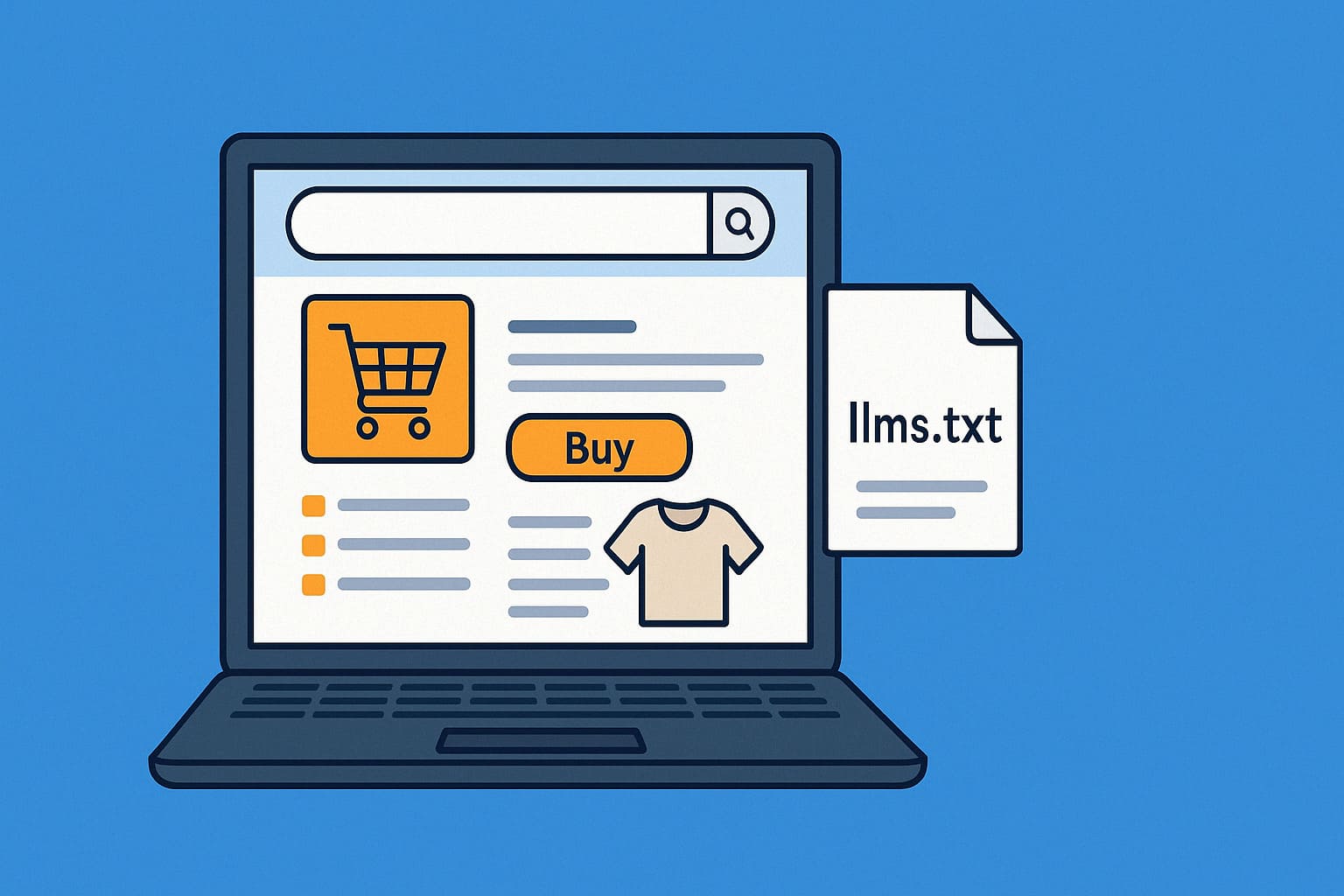LLMs.txt for E-commerce Sites: How Online Stores Can Leverage AI Search
- Posted 5 days ago
In the world of e-commerce, staying ahead of the curve means embracing new technologies that can enhance the shopping experience for users. One of the most promising developments in this space is the use of AI-driven search, particularly through tools like LLMs.txt. This guide will explore how online stores—whether hosted on platforms like Shopify, WooCommerce, or other e-commerce solutions—can leverage AI search through LLMs.txt to improve product discoverability, enhance user experience, and optimize search results for both customers and search engines.
Understanding LLMs.txt: What Is It?
Before we delve into the specifics of how e-commerce sites can use LLMs.txt, let’s first understand what it is. LLMs.txt is a text file format designed to control AI crawlers and search engines on how they interact with your site’s content. It allows webmasters to specify which pages or sections of their website should be indexed or excluded from AI-driven indexing.
For online stores, LLMs.txt plays a crucial role in guiding AI-powered search engines and crawlers—such as those used by AI chatbots or personal assistants—on how to best process and display product information. With the growing role of AI in e-commerce, understanding and utilizing LLMs.txt is key for optimizing search results and improving overall visibility.
Use Cases for LLMs.txt in E-Commerce

E-commerce platforms like Shopify, WooCommerce, and Magento have become hubs for businesses looking to sell products online. AI-powered search engines can analyze these platforms to help customers find what they’re looking for quickly. But to ensure that AI crawlers index product pages correctly, it’s essential to use LLMs.txt strategically. Below are some use cases for LLMs.txt in e-commerce:
1. Optimizing Product Discoverability
AI search engines increasingly focus on product relevance rather than just keywords. By structuring LLMs.txt properly, e-commerce stores can optimize their product discoverability by guiding the AI to index the most relevant pages and content. For example, product summary pages, product details, and categories can be structured to ensure AI engines display the best results for customers.
For Shopify and WooCommerce sites, LLMs.txt can guide AI crawlers on how to handle pages that contain similar products. These pages may have overlapping content, and without proper indexing, they may confuse AI search engines. Using LLMs.txt can help define the importance of certain pages over others to ensure the right products appear in search results.
2. Improving Search Result Accuracy
When it comes to AI-powered search engines, accuracy is critical. Customers often perform searches with specific intent, such as “best running shoes for women” or “affordable vegan skincare.” AI search engines strive to return the most accurate, relevant products based on these queries.
By structuring product categories and summaries correctly in the LLMs.txt file, e-commerce stores can enhance the accuracy of AI search results. For example, by marking certain products as “featured” or “top-rated,” or adding specific tags like “vegan,” “eco-friendly,” or “on sale,” online stores can ensure that AI engines prioritize these features in search results.
3. Boosting SEO Performance
E-commerce stores have long understood the importance of search engine optimization (SEO), and AI search engines are no different. A properly configured LLMs.txt file helps guide AI crawlers to optimize SEO performance by defining which product pages should be indexed. Moreover, AI-generated product summaries that contain high-value keywords can be structured to boost search engine rankings.
A common mistake many online stores make is not optimizing product URLs and categories correctly. This is where LLMs.txt comes into play, allowing store owners to control AI access to URLs with duplicate or irrelevant content.
Leveraging AI Search: Product Summaries Generated by AI Engines
One of the key advantages of AI search in e-commerce is the ability to automatically generate product summaries, descriptions, and even reviews based on data from product listings. By leveraging AI engines, online stores can automate the creation of compelling product summaries that enhance the shopping experience for customers and improve SEO.
Example: AI-Generated Product Summaries
Consider an online store that sells various electronics. Using AI search, the AI engine can scan product details such as specifications, features, and customer reviews to automatically generate a concise, engaging product summary. For example:
Product: Noise Cancelling Headphones
AI-Generated Summary: These over-ear headphones are designed for maximum comfort and exceptional sound quality. Equipped with active noise-cancelling technology, they provide an immersive listening experience, whether at home or on the go. Features include Bluetooth connectivity, a 30-hour battery life, and a built-in microphone for hands-free calls.
Such summaries not only enhance the user experience by providing key product details in a digestible format but also improve SEO by incorporating valuable keywords like “noise-cancelling,” “comfort,” and “Bluetooth.” These AI-generated summaries can be indexed using LLMs.txt to help AI crawlers prioritize key content over non-relevant information.
How to Structure Categories and Product URLs in LLMs.txt
An essential part of leveraging LLMs.txt for e-commerce sites involves structuring product categories and URLs effectively. Product URLs and category pages should be indexed properly to allow customers and AI search engines to navigate your site easily.
1. Optimize Product URLs for AI Crawlers
In the past, e-commerce stores might have used generic product URLs that did not contribute to SEO. Today, URL structure is vital for both AI search engines and traditional search engines. When you create a URL structure, consider the following tips:
- Use Descriptive Keywords: Product URLs should include keywords relevant to the item being sold. For example:
www.yourstore.com/smartphones/iphone-13-pro-max - Avoid Dynamic URLs: Dynamic URLs with parameters (e.g.,
www.yourstore.com/product?id=12345) can confuse AI search engines. Instead, opt for clean, static URLs. - Hierarchical URL Structure: Create categories that represent the logical hierarchy of your products. For example:
www.yourstore.com/electronics/smartphones/apple/iphone-13-pro-max
By using clear and descriptive URLs, you make it easier for AI crawlers to index and display relevant products.
2. Structuring Categories in LLMs.txt
Categories are an important part of any e-commerce site, as they help customers filter and find products easily. AI search engines also rely on well-organized categories to deliver accurate results. Here’s how you can structure categories in your LLMs.txt:
txtCopyUser-agent: AI_Crawler
Disallow: /category/electronics/sale
Allow: /category/electronics/smartphones
Allow: /category/electronics/laptops
In this example, AI crawlers are instructed to index the smartphones and laptops categories, while the sale category is excluded. This ensures that AI search engines prioritize high-value product pages over discounted or outdated products, improving the accuracy of search results.
3. Optimizing Product Pages for AI Search
Your product pages should not only include compelling summaries but also be organized in a way that AI crawlers can easily access relevant content. Ensure your product descriptions are structured logically, include relevant tags, and use appropriate HTML markup to enhance product details.
For example:
txtCopyUser-agent: AI_Crawler
Allow: /product/iphone-13-pro-max
Allow: /product/galaxy-s21-ultra
Disallow: /product/iphone-13-pro-max/old
In this case, the product pages for iPhone 13 Pro Max and Galaxy S21 Ultra are allowed, while an outdated version of the iPhone is excluded. This ensures that only the most relevant products are indexed, improving both the user experience and SEO performance.
Read Also : Top AI Crawlers to Watch in 2025: How to Optimize for Them Using LLMs.txt
Conclusion
LLMs.txt provides an essential tool for e-commerce sites to optimize their interaction with AI search engines. By leveraging this tool effectively, online stores can enhance product discoverability, improve search accuracy, and boost SEO performance. For platforms like Shopify and WooCommerce, using LLMs.txt ensures that the AI crawlers are directed to the most relevant product pages, providing customers with a seamless shopping experience.
Properly structuring product URLs, categories, and using AI-generated product summaries can help online stores get the most out of AI-driven search engines. By embracing LLMs.txt and AI search technology, e-commerce businesses can stay ahead of the competition and offer their customers the best shopping experience possible.
